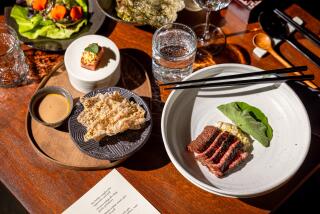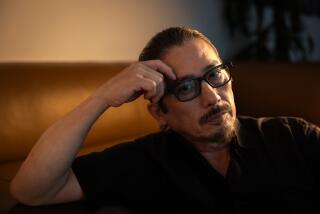STAGE REVIEW : Nishikawa on ‘A Mission From Buddha’
Lane Nishikawa’s back in town. It’s been a while. The last call he paid was at the Odyssey in 1982, when he brought the city one of the earliest examples of explosive ethnocentric one-man sorties under the apt heading of “Life in the Fast Lane.” Read that last word as a pun on his name. Fast Lane is back with a new show entitled “I’m on a Mission From Buddha,” and a ream of fresh assaults. This time on what it is to be Japanese-American in the ‘90s.
Different, and not. The material is different. And the times. The centrifugal poetic impulse is not. The visitor in Theatre 4 of the Los Angeles Theatre Center is one tough 5-foot-2 Sansei--a “Buddhahead” from Hawaii who left to become a “Katonk” in San Francisco (interchangeable terms for Japanese-American, he tells us, that change according to locale). His core is molten lead, his language is all friskiness and abrasion, even on the guarded occasions when he is being tender.
This presentation of one-man reminiscences, ramblings and observations is done as a series of blackouts, whose impact is sometimes exponentially magnified by extreme brevity. The force of each sketch varies widely, depending on the weight of the content.
What the program captures kaleidoscopically is an essence of what it is to be Japanese-American. Nishikawa is a poet first, an actor second, a presence always. At its best, his writing carries the show. It is the audible manifestation of the fusion of the Asian and the American within him. “Asian as American pie,” go the lines. “It’s here we’re gonna live and die.”
The social commentary, which is his main thrust and lies somewhere between stand-up comedy and straight acting, covers everything from the astonishment of his first visit to Tokyo (“This is like a huge J-town. I never felt so lost !”), to the consumption “pets” at the Asian dinner table.
Its humorous elements rely heavily on the absurdities of cultural contradiction, such as the more-Texan-than-thou Japanese-American father who embarrasses his son in a sushi bar with his attitude about the strange food.
But Nishikawa’s range is unfettered and unpredictable. He strikes as satirically at the Japanese counterparts of Hollywood’s cultural icons (“the John Wayne of our people, Toshiro Mifune”) as he does at himself in the acting world, observing contendedly that he spent all that time doing odd jobs just so he could get up on stage and portray the same odd jobbers in a stereotype. “Did I really want to leave the world of nonprofit theater?,” he croons seductively.
Not all of this is delivered with consistent sureness. The performance, directed by Eric Hayashi, gets untidy here and there. A Saturday-night barroom exchange among himself, a beckoning buxom blonde and her six-foot boyfriend is messy and superficial. A rap number gets a bit overextended.
Nishikawa is always at his best when the language takes over and we’re exposed to a tumbling profusion of cultural images racing by, from the Japanese-American definition of R&R; (redress and reparation), to his ironic reduction of sage philosophies into modern greed (“the planting of VCRs all over the world . . .”) and withering asides on Asian-American anchors as the triumph of all-American tokenism.
Only once does Nishikawa allow himself to get serious--on the subject of the Japanese-Americans (“the 442”) who fought and died in World War II. Here we can measure the real depth and extent of his talent. It is a still, glowing, utterly vulnerable moment.
“Nishikawa’s vivid, tangled impressions come out of him like low-voltage electrical impulses,” a colleague wrote nearly nine years ago. That may be the only thing over time that hasn’t changed.
* “I’m on a Mission From Buddha,” Los Angeles Theatre Center, 514 S. Spring St. Tuesdays-Saturdays, 8 p.m.; Sundays, 7 p.m.; matinees Saturdays-Sundays, 2 p.m. Indefinitely. $16-$18; (213) 627-5599). Running time: 80 minutes.
‘I’m on a Mission From Buddha’
Lane Nishikawa Fast Lane
One-man vignettes from Japanese-American life written by Lane Nishikawa and presented by the Asian American Theatre Company. Director Eric Hayashi. Sets Sandra Howell. Lights Jim Schelstrate. Costumes Katherine Mandery. Stage manager David S. Franklin. Production manager Dennis Lowry.
More to Read
The biggest entertainment stories
Get our big stories about Hollywood, film, television, music, arts, culture and more right in your inbox as soon as they publish.
You may occasionally receive promotional content from the Los Angeles Times.










